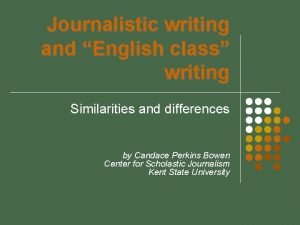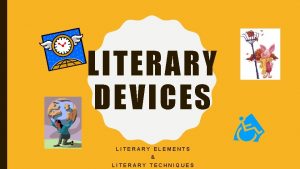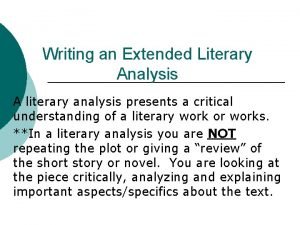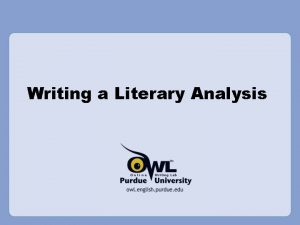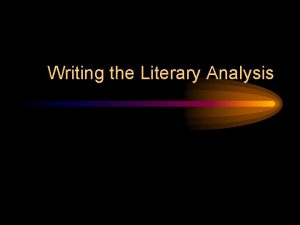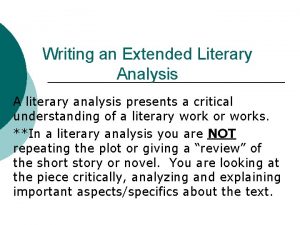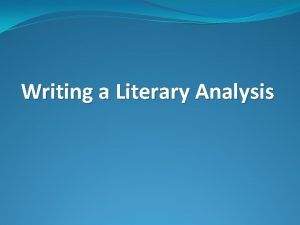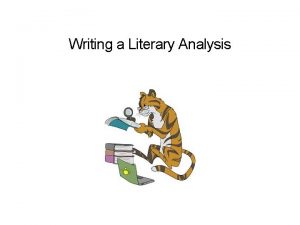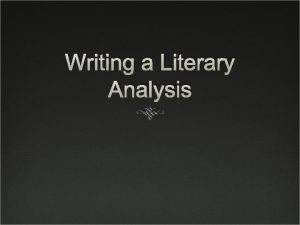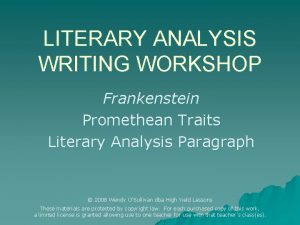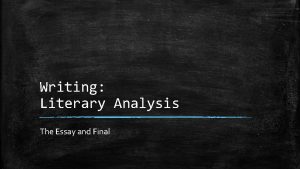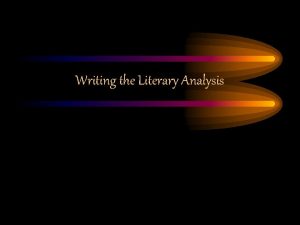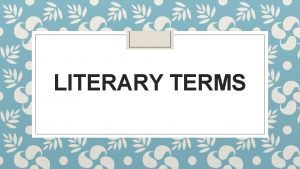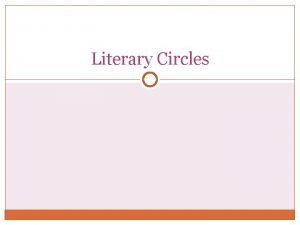Writing the Literary Analysis What is Literary Analysis




















- Slides: 20

Writing the Literary Analysis

What is Literary Analysis? • • • It’s literary It’s an analysis It’s-An Argument! It may also involve research on and analysis of secondary sources

How is it “literary”? • Usually, a literary analysis will involve a discussion of a text as writing, thus the term literary, which means “having to do with letters” • This will involve the use of certain concepts that are very specifically associated with literature

Important literary concepts • The Basics – – – Plot/Setting Narration/point of view Characterization Symbolism Metaphor Tone/diction/syntax/ imagery – Genre – Irony/ambiguity • Other key concepts – Historical context – Social, political, economic contexts – Ideology – Multiple voices – Various critical orientations – Literary theory

How Can I Learn More? • There are various handbooks of literary terms available in most libraries. • There are numerous introductions to literary criticism and theory that are widely available. • Example: A Handbook to Literature. Harmon/Holman

What is an Analysis? • An analysis of a literary work may discuss – How the various components of an individual work relate to each other – How two separate literary works deal with similar concepts or forms – How concepts and forms in literary works relate to larger aesthetic, political, social, economic, or religious contexts

How is a literary analysis an argument? • When writing a literary analysis, you will focus on specific attribute(s) of the text(s). • When discussing these attributes, you will want to make sure that you are making a specific, arguable point (thesis) about these attributes. • You will defend this point with reasons and evidence drawn from the text. (Much like a lawyer!)

About Thesis Statements • A thesis can be either simplistic or sophisticated. • It is important to remember that thesis statement controls the entire composition – a focused, concise thesis statement will give you a greater chance of producing writing that clearly communicates your argument.

Which is the best thesis statement? • • Moby-Dick is about the problem of evil. Moby-Dick is boring and pointless. Moby-Dick is about a big, white whale. The use of “whiteness” in Moby-Dick illustrates the uncertainty about the meaning of life that Ishmael expresses throughout the novel.

Easy-Peasy Thesis Statements • So now you’re thinking, “That’s nice and all, but how do I do this? ” • Here’s an easy-peasy thesis helper: • In (title of novel or poem), (Author’s name) uses (1 st lit device), (2 nd lit device), and (3 rd lit device) to (depict, criticize, explain, etc. ) (some aspect of human life).

Easy-Peasy Thesis Statements • Let’s see what this might look like: • In Pride and Prejudice, Jane Austen uses omniscient narration, vivid diction, and unusual syntax to depict the etiquette-driven world of Regency Era England. • The most important part of this is what happens after the word TO!

How do I support a thesis statement? • Examples from the text: – Direct quotations – Summaries of scenes – Paraphrase • Other critics’ opinions • Historical and social context • Always remember to read carefully and highlight useful passages and quotes!

How do I avoid superficiality? • If all you do in one body paragraph is to give a few examples of irony from the text and identify them as irony, then you haven’t analyzed anything! • The analysis part involves explaining how those examples are ironic, and how they help to communicate your thesis (i. e. how they help to communicate theme). • You must interpret what the author has given you to work withy.

Next: Draft Topic Sentences • Once you have a solid thesis: • Compose 4 -5 Topic Sentences that support, explore, demonstrate, explain, or illustrate your thesis. Always begin your body paragraphs with a Topic Sentence (a claim); NEVER begin a body paragraph with a quotation or summary sentence.

Find Evidence • Select specific passages that offer the reader evidence of your claim. • Incorporate only the most important phrases into each paragraph. Use ellipses if needed.

Build your Paper to a Climax • Save your most engaging or important topic sentence for your last body paragraph. • Conclude your paper with a paragraph that does more than simply summarize your main points. You may wish to echo your opening interest device or end with an insight.

What is a secondary source? • A book or article that discusses the text you are discussing • A book or article that discusses a theory related to the argument you are making • A book or article that discusses the social and historical context of the text you are discussing

How do I find secondary sources? • MLA International Bibliography • Dictionary of Literary Biography • Discipline-specific sources – Example: America: History and Life for American literature • Other search engines • A bibliography that is part of your text • Ask someone who knows

Integrating secondary sources • When you use secondary sources, be sure to show they relate to your thesis • Don’t overuse any one secondary source, or for that matter, secondary sources in general • Remember that this is your paper, your argument —the secondary sources are just helping you out • Never, never plagiarize! See the OWL handout on plagiarism for more information.

Overview of Literary Analysis • When writing a literary analysis: – Be familiar with literary terms – Analyze specific items – Make an a argument – Make appropriate use of secondary sources – Consult instructors and tutors for help when needed
 Journalism and literature similarities
Journalism and literature similarities Hình ảnh bộ gõ cơ thể búng tay
Hình ảnh bộ gõ cơ thể búng tay Bổ thể
Bổ thể Tỉ lệ cơ thể trẻ em
Tỉ lệ cơ thể trẻ em Chó sói
Chó sói Glasgow thang điểm
Glasgow thang điểm Chúa yêu trần thế
Chúa yêu trần thế Môn thể thao bắt đầu bằng từ đua
Môn thể thao bắt đầu bằng từ đua Thế nào là hệ số cao nhất
Thế nào là hệ số cao nhất Các châu lục và đại dương trên thế giới
Các châu lục và đại dương trên thế giới Công của trọng lực
Công của trọng lực Trời xanh đây là của chúng ta thể thơ
Trời xanh đây là của chúng ta thể thơ Mật thư tọa độ 5x5
Mật thư tọa độ 5x5 101012 bằng
101012 bằng độ dài liên kết
độ dài liên kết Các châu lục và đại dương trên thế giới
Các châu lục và đại dương trên thế giới Thể thơ truyền thống
Thể thơ truyền thống Quá trình desamine hóa có thể tạo ra
Quá trình desamine hóa có thể tạo ra Một số thể thơ truyền thống
Một số thể thơ truyền thống Cái miệng xinh xinh thế chỉ nói điều hay thôi
Cái miệng xinh xinh thế chỉ nói điều hay thôi
